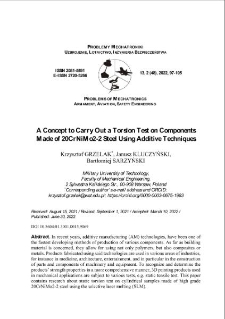Our Digital Library contains 1 868 digital objects
Object
Title: A Concept to Carry Out a Torsion Test on Components Made of 20CrNiMo2-2 Steel Using Additive Techniques
Alternative title:
Contributor:
Janusz KLUCZYŃSKI, Bartłomiej SARZYŃSKI
Abstract:
In recent years, additive manufacturing (AM) technologies, have been one of the fastest developing methods of production of various components. As far as building material is concerned, they allow for using not only polymers, but also composites or metals. Products fabricated using said technologies are used in various areas of industries, for instance in medicine, architecture, entertainment, and in particular in the construction of parts and components of machinery and equipment. To recognize and determine the products’ strength properties in a more comprehensive manner, 3D printing products used in mechanical applications are subject to various tests, e.g. static tensile test. This paper contains research about static torsion test on cylindrical samples made of high grade 20CrNiMo2-2 steel using the selective laser melting (SLM). Such an approach allowed to observe the material behaviour and to determine specific values of strength properties, such as the maximum tangential stresses in the material and bulk modulus of elasticity (shear modulus). The determination of such parameters allowed to compare them with the results of the tests carried out on components manufactured using other methods (e.g. a cold drawn solid bar sample).
Place of publishing:
Warszawa
Publisher:
Date created:
Date submitted:
Date accepted:
Date issued:
Extent:
Identifier:
oai:ribes-88.man.poznan.pl:2643
Call number:
Electronic ISSN:
Print ISSN:
Language:
License:
Rights holder:
Starting page:
Ending page:
Volume:
Keywords:
additive manufacturing technologies, 3D printing, static tensile test, static torsion test
Object collections:
Last modified:
Oct 13, 2025
In our library since:
Oct 13, 2025
Number of object content hits:
0
All available object's versions:
https://ribes-88.man.poznan.pl/publication/2972
Show description in RDF format:
Show description in OAI-PMH format:
| Edition name | Date |
|---|---|
| A Concept to Carry Out a Torsion Test on Components Made of 20CrNiMo2-2 Steel Using Additive Techniques | Oct 13, 2025 |
Objects Similar
Daniel KOTTFER Vladimir BELLA
Marek A. BURDEK Jarosław MARCISZ, Jerzy STĘPIEŃ, Ewelina SKOWRON, Zbigniew HAJDAK, Bogumiła KOWALIK, Józef KRÓL
Igor BARÉNYI Ondrej HÍREŠ, Peter LIPTÁK
Paweł BIAŁOBRZEWSKI Judyta SIENKIEWICZ, Jacek JANISZEWSKI, Janusz KLUCZYŃSKI

